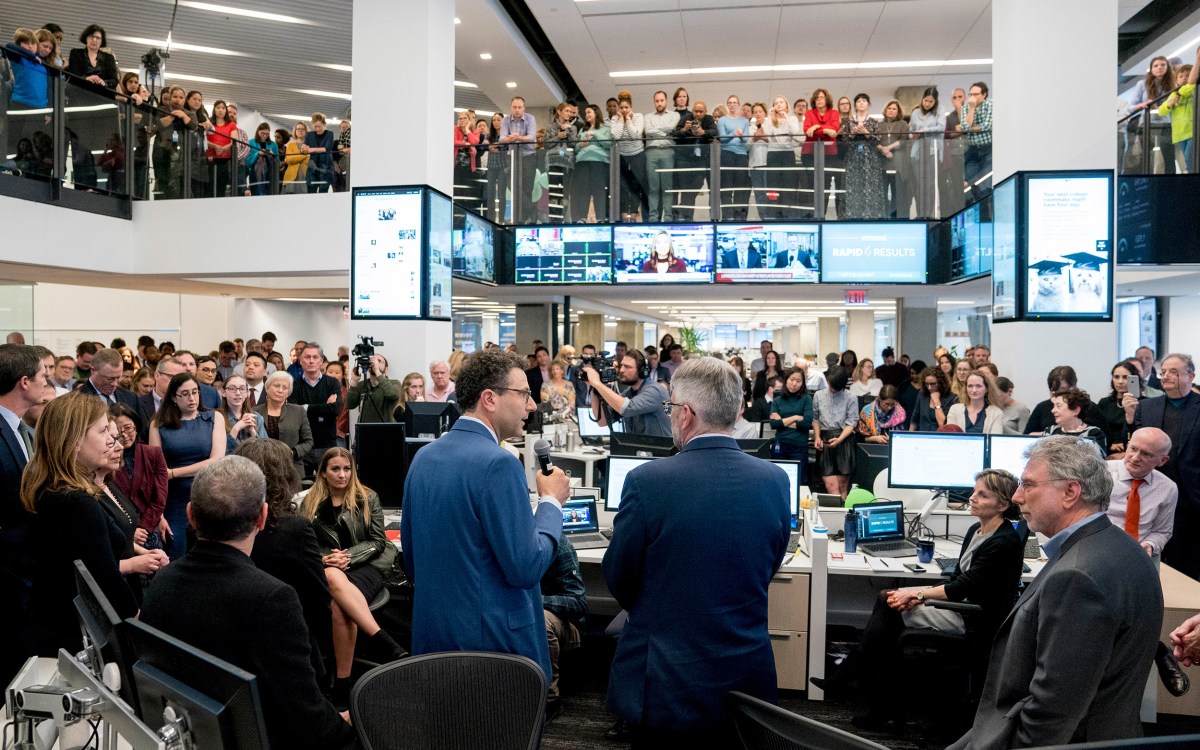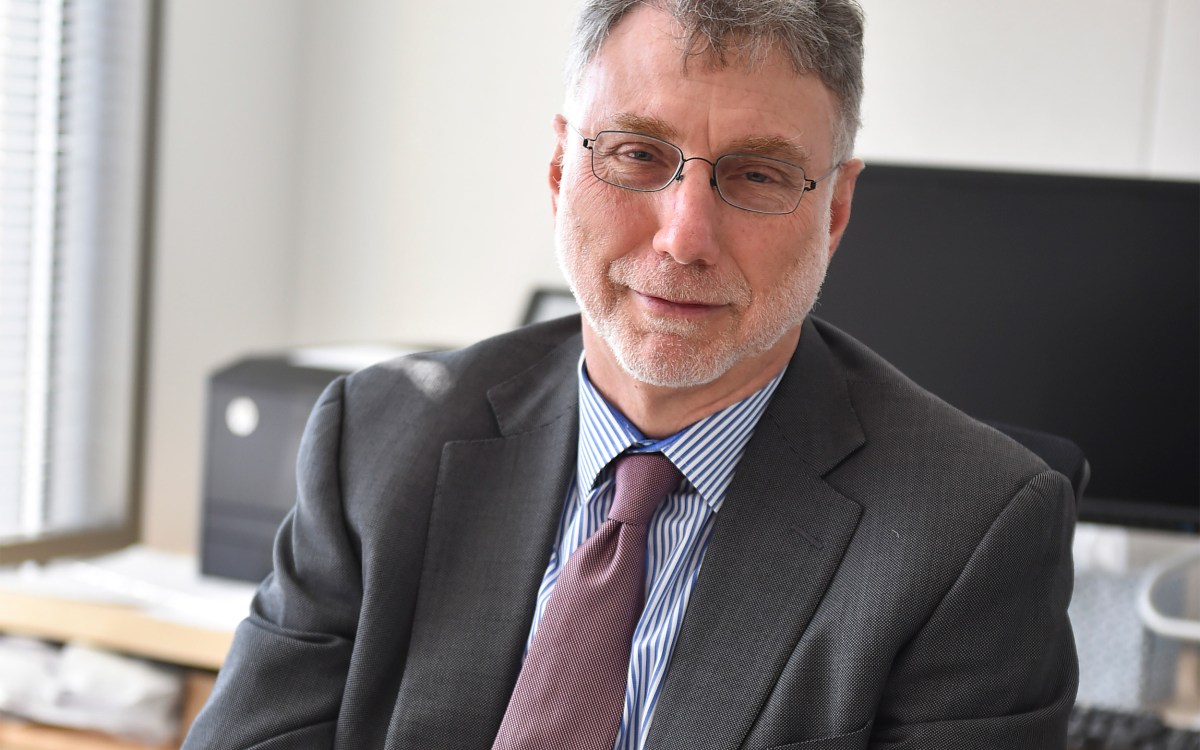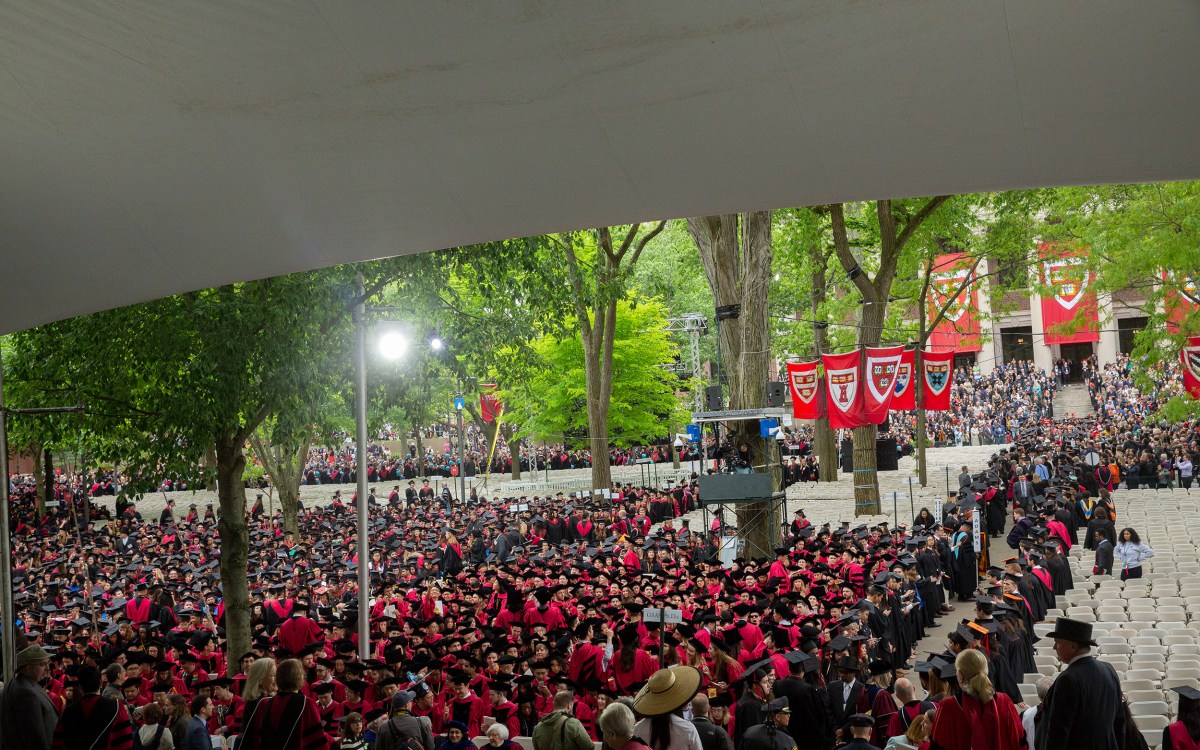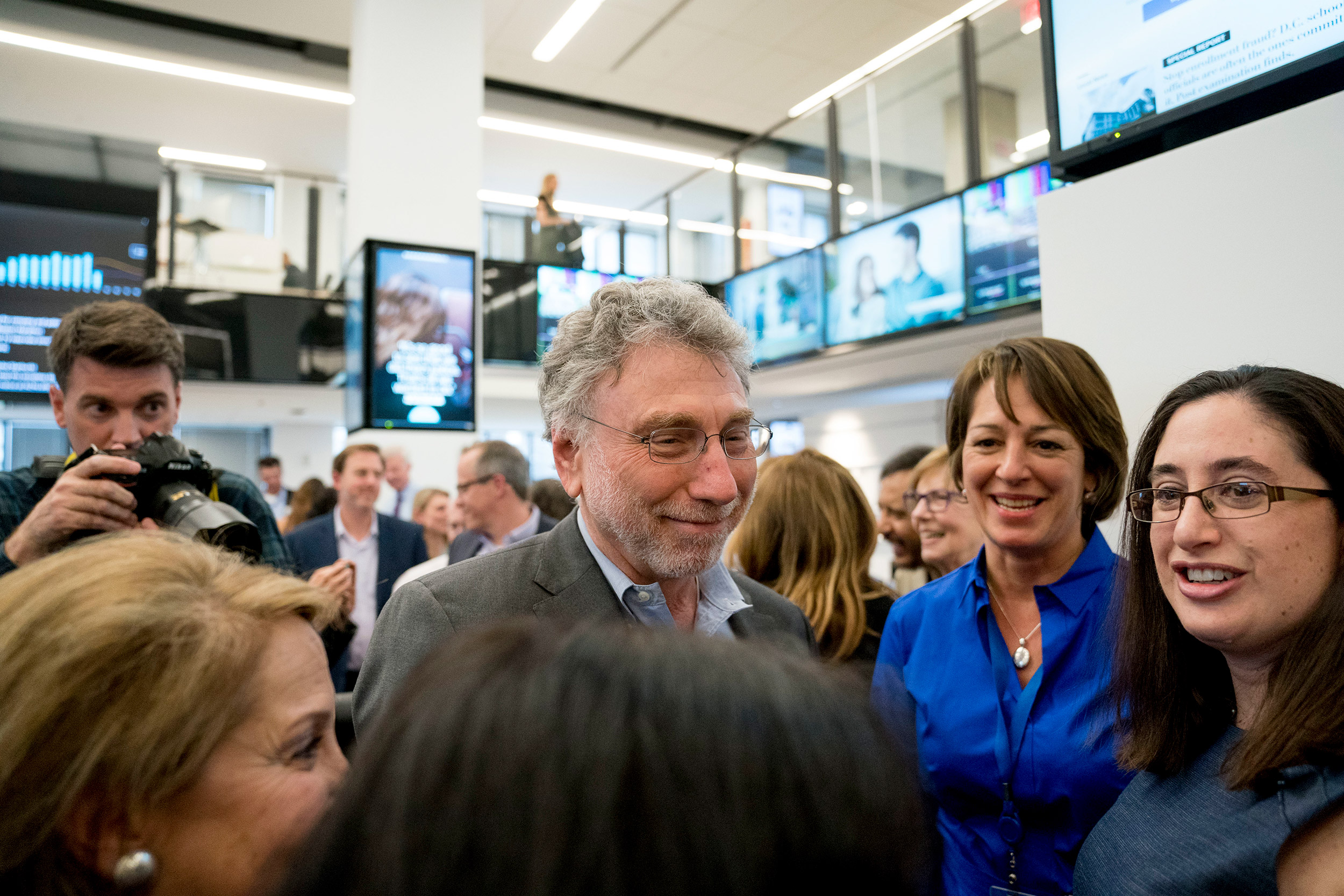
Washington Post executive editor Marty Baron celebrates with his staff after winning two Pulitzer Prizes, April 16, 2018. Baron is pictured with Carol Leonnig (right of Baron) and Roz Helderman ’01. On Thursday, Baron will speak in a virtual graduation ceremony, Honoring the Class of 2020.
AP Photo/Andrew Harnik
Martin Baron, on his life, his calling, and the importance of shedding light
Washington Post editor, this year’s graduation speaker, answers questions instead of asking them
Esquire magazine asked in a 2015 cover story: “Is Martin Baron the Best News Editor of All Time?” That the question may credibly be posed says much about Baron’s stature in American journalism. Virtually every reporter and editor who ever worked for him in Miami, Boston, and now in D.C., where he is executive editor of The Washington Post, will tell you these things about him: He is smart, exacting, fearless, driven, and has an unwavering sense of integrity.
His newsrooms have won 16 Pulitzer Prizes, including honors for uncovering the National Security Agency’s secret surveillance of American citizens, finding surprising patterns in fatal police shooting victims across the nation in 2015, investigating Russian interference in the 2016 presidential election, and uncovering decades of child sexual abuse by Catholic priests and cover-ups by the Boston Archdiocese, disclosures that triggered a global reckoning for the church.
Baron, who’s called “Marty” in daily life, will be the principal speaker honoring the Harvard Class of 2020 on Thursday, May 28, at 11 a.m. In advance of his online address, he provided insights to the Gazette, recapped his 44-year career, and explained why good journalism is vitally important.
Q&A
Martin Baron
GAZETTE: What’s a typical day like for you? Are you on call 24/7? Can you ever turn off your phone?
BARON: I am pretty much on duty 24 hours a day, although I do get to sleep, thankfully. I get up at about 5:45 in the morning, typically, immediately check out what the news is on our website, as well as on that of some of the competitors. I look at some of the alerts that perhaps have come in overnight, any email that may have come in on issues that need to be addressed. And then, over the course of the morning, I’m reading stories of our own, as well as other publications. I typically get in the office around 8:30 or so, unless I have a breakfast or something like that. We have our first morning meeting at 9:30, our first news meeting. We talk about what has already been posted on our website, what will be posted during the course of the morning, and later in the day. We talk about what different department heads are pitching for page one of the newspaper. And then, the rest of the day until about 4 p.m., is meetings with staff, personnel matters, reading stories that are scheduled for publication, meeting people outside of the office, and meeting with people on the business side of our organization, as well. At 4, we have our afternoon meeting, and we talk about what’s likely to be posted to our website over the course of the late afternoon and evening. We take a look at the plans for page one that have been drawn up. People have an opportunity to comment and talk about what they’re working on for the next day. And news, of course, is breaking throughout the day and overnight as well, and so we’re dealing with that as it develops.
GAZETTE: Let’s go back a bit. You knew as a teenager that you wanted a career in journalism. Why? What did you think the job was at that age?
BARON: When you’re young, you have no idea, really, what’s involved in these careers. But my parents, as immigrants [from Israel], were keenly interested in what was happening in the world and in what was happening in this country they had come to. So we had a habit in the household of reading and viewing the news. My parents received the daily newspaper, the hometown newspaper, the Tampa Tribune, which doesn’t exist any longer. They watched the nightly news, typically, “The Huntley-Brinkley Report” on NBC, and then they watched the local news. They also received Time magazine every single week. So there was a culture of interest in public affairs and indulging that interest by reading the paper and listening to the news. I’m confident that’s how I became interested in it. I was a pretty voracious reader of it myself, and so I just got interested. That was a way of being engaged with public affairs. I started working for my high school newspaper, and then I worked for my college newspaper. During college I worked three summers as an intern with my hometown newspaper. And when I got out of college, I immediately started working for the Miami Herald.
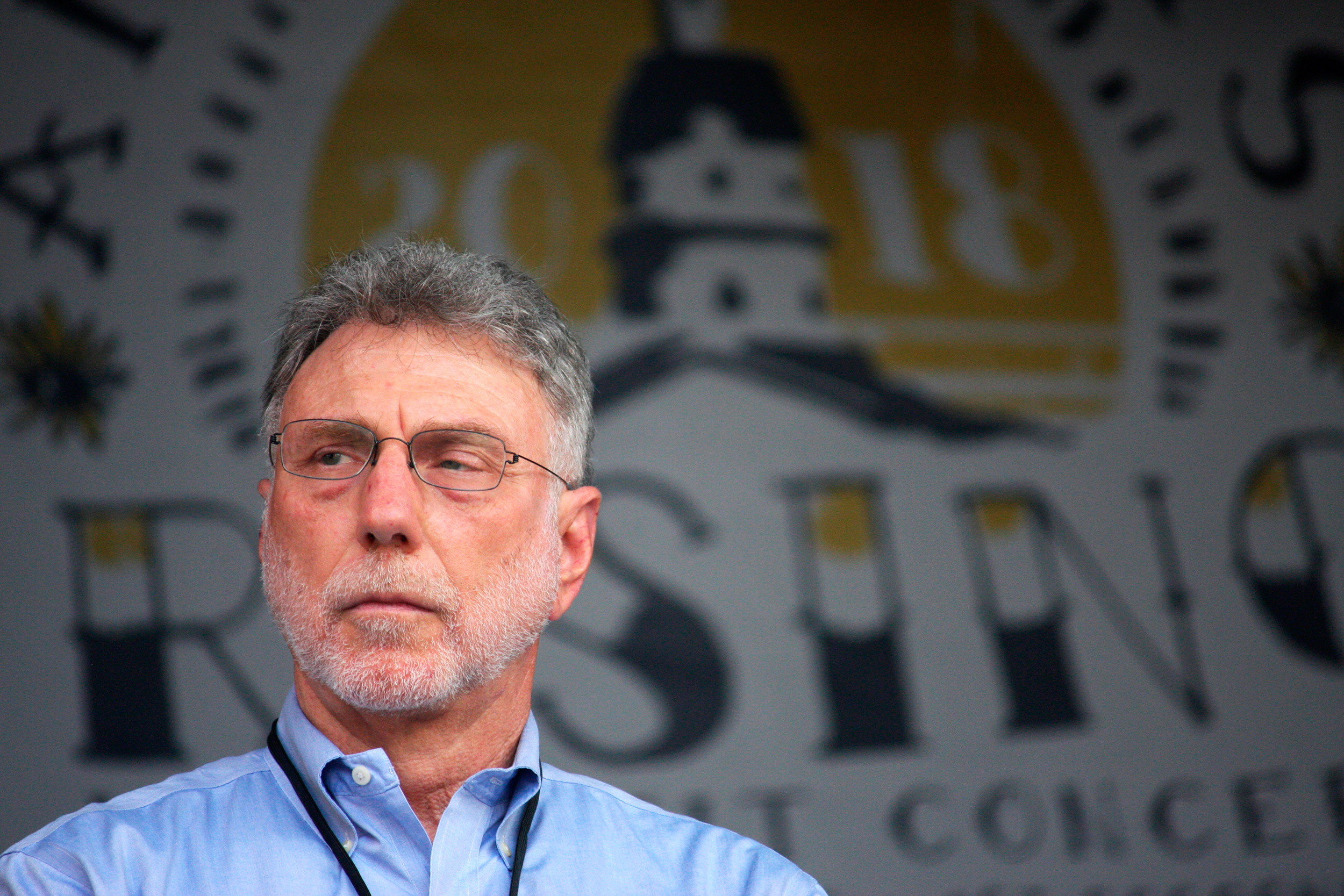
Martin Baron manages The Washington Post’s news operations and a staff of more than 850 journalists. During his 44-year career, he has led three of the nation’s most influential newspapers, held top posts in two others, and shepherded his news staffs to 16 Pulitzer Prizes.
AP Photo/Brian Witte
GAZETTE: You graduated from Lehigh University with a joint B.A./M.B.A. degree. Were you genuinely interested in business, or was that more of a fallback, perhaps to satisfy your parents?
BARON: Partially it was. I’m pretty confident they had in mind something else for me. My mother repeatedly would ask me, even after I got into the profession, whether I didn’t want to think about going to law school because so many of my friends had gone to law school. I told her that I was very interested in the law, but that I just wasn’t interested in spending full time on that. I like the immediate, relatively short-term gratification of producing a story, editing a story, seeing the results on a fairly short timeframe. But my parents were fine with it. When I got out of college, I wasn’t absolutely sure that I was going to go into journalism. I thought I might want to go into journalism, but I also thought that if I decided to go into business, it would be helpful to have the M.B.A. I knew enough about journalism at the time, oddly enough, that it was becoming more specialized, so I thought it would be really useful if I had an expertise in business. If I had not gone into journalism? I might have gone to law school, I might have gone into business. I never really did think about anything else.
GAZETTE: After college, you started at the Miami Herald. What did they have you do?
BARON: They assigned me to a two-person bureau in a little town called Stuart, Fla. At the time, there were 12,000 people in the entire town and 50,000 people in the entire county. It stretched from the coast to essentially Lake Okeechobee, but most of the people were on the coast, and toward the lake were a lot of migrant workers. There weren’t a lot of gigantic stories there. We had to fill a page every day, six days a week, and take our own photographs, so it was a grind. Somebody who was applying for a job there called me as he was trying to make a decision whether to come. And he asked me what I did in my spare time, and I told him I did my laundry. [Laughs.] He did not take the job. After that, they didn’t allow anybody else to call me. It was a start. That’s all I was looking for. I was looking for a paying job, and I got one for $200 a week. And that was it.
GAZETTE: Every paper you’ve led has won numerous awards, including Pulitzer Prizes. What’s the key to consistently delivering award-winning journalism?
BARON: I think that we always have to be asking: What is the truth here? What don’t we know? And not just what we as a news organization should know, but what should the public know? And when there are doubts about what the truth is, then we are determined to find out and persist in those efforts. And so that’s what we try to do. That’s what we did in Boston. The issue there was: Did the Cardinal [Bernard Law] himself know about the abuse by one particular priest and yet reassign him from parish to parish to parish? Was this emblematic of a pattern of cover-up of clergy who engaged in sexual abuse? And so we set about trying to answer that question. In Miami, in the year 2000, amid the presidential election, it was uncertain who had won the state of Florida. Was it Al Gore or was it George W. Bush? And while the Florida Supreme Court had ordered a recount, the U.S. Supreme Court ordered that there would be no recount. So we set about trying to find out who really prevailed in that election. Fortunately, under the Florida public records law, we were entitled to look at every single ballot. So we went to every one of the 67 counties in Florida and looked at every ballot that was cast, accompanied by a major accounting firm, which did its own count.
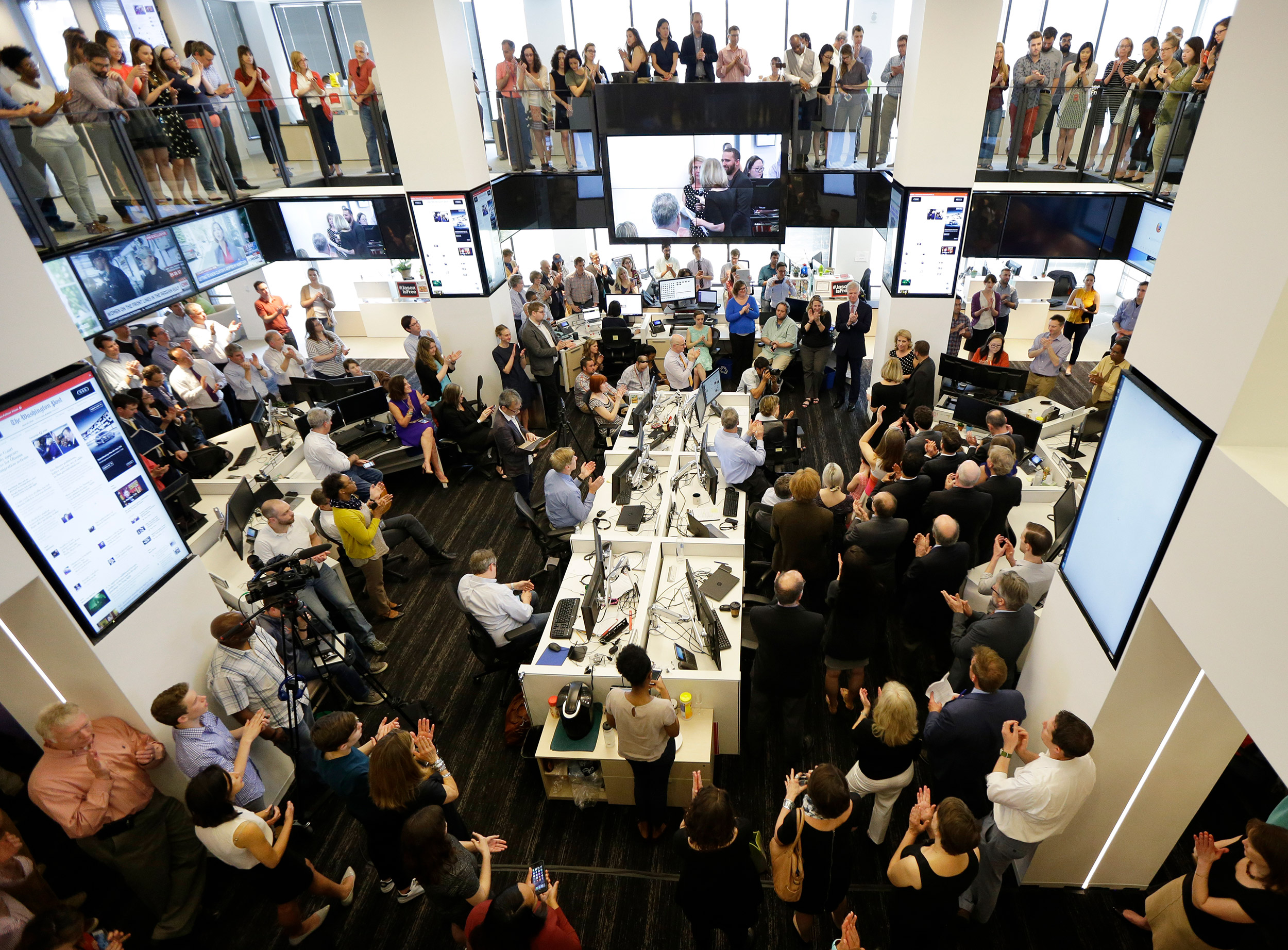
In 2016, The Washington Post celebrated its Pulitzer Prize for National Reporting for its revelatory initiative in creating and using a national database to illustrate how often and why the police shoot to kill and who the victims are most likely to be.
AP Photo/Manuel Balce Ceneta
GAZETTE: In 2017, The Post adopted the tagline “Democracy dies in darkness.” Three years later, as many departments and functions of the federal government have become politicized, does democracy still die in darkness or is it expiring right out in the open, in the bright light of day?
BARON: Well, it’s good question. We’re not prepared yet to change the motto, by the way. [Laughs.] What that motto is really getting at is that it’s our job to reveal what is happening within government in particular and within powerful institutions, and that if we’re not doing that, then democracy is not likely to thrive. Our job is to bring transparency, to bring light to government and to the influence that powerful institutions and powerful individuals have on our lives. It’s true. I do think that there is an assault on our democratic institutions and on democratic norms. That’s deeply concerning. A lot of what might have occurred behind the scenes in the past is now occurring right out in the open. But there’s still a lot happening behind the scenes. And so our job is to cover, and cover well, both what’s happening behind the scenes and what the implications are of what’s happening openly.
GAZETTE: Has the industry done a good enough job defending itself against attacks, explaining what journalism is and what it’s not, or promoting how society benefits from journalism? Do you think letting the work speak for itself is a mistake in hindsight, given where we are right now?
BARON: I think we’ve done a terrible job as an industry in explaining ourselves. In the past, we have felt like, “Oh, the work will speak for itself.” But while the work should speak for itself, it doesn’t. And so I think that over many years, the public has come to take the work of journalism for granted. They’ve come to think that a democracy can exist without a vigorous, free, and independent press. And the reality is that it cannot. We’ve done a really bad job of explaining the importance of free and independent press to our democracy, to our system of governance generally, to our communities. What happens when you don’t have a press? We can see that now in much of the country where newspapers which historically have been the preeminent provider of news about communities, many of those newspapers are now dying and disappearing or they’re being stripped down so much that they hardly have any journalistic resources available to do true journalism and things go uncovered. Politicians know that they’re not being covered. They know that they can get away with things that they wouldn’t have previously. When the public is uninformed, it is susceptible to manipulation. And I think that the press has done a really bad job of explaining why it’s necessary and what its contribution is to our country and to our communities.
GAZETTE: People say you’re a terrific spokesman for the profession. How do you feel about that mantle?
BARON: It’s not something I ever expected for myself, certainly not something that I sought. It just kind of happened. Somewhat previously when I was in Boston, because of the church investigation, but particularly now in the current environment, I think it’s important that somebody stand up and speak to the principles of our profession and to the practices of our profession, and help explain who we are and what we’re trying to accomplish. And there aren’t that many of us around to do it, so I’ve been, I guess, involuntarily enlisted in that. I don’t shy from it. I didn’t seek it. But I think it’s incredibly important, and it’s one of the most important things that I can do. I hope it has some impact.
“I think we’ve done a terrible job as an industry in explaining ourselves. In the past, we have felt like, ‘Oh, the work will speak for itself.’ But while the work should speak for itself, it doesn’t.”
GAZETTE: Have you given any thought to retirement? When will you know that you’re ready to move on?
BARON: I think I will always be involved in journalism in one way or another. The question is whether I’m running a large newsroom and how long I want to do that. I don’t plan to withdraw and become a hermit. I’ll still be engaged in one way or another — at least I hope to be. But I have to think about it. I haven’t made any decisions. I’m 65. I’ve been doing this for a long time. I’ve been in the business for 44 years, and I’ve been a top editor for 20. These are exhausting jobs. There are a lot of pressures, and they don’t give you a lot of opportunity to just kick back and relax. And that’s something that I need to think about.
This interview has been edited for clarity and length.



